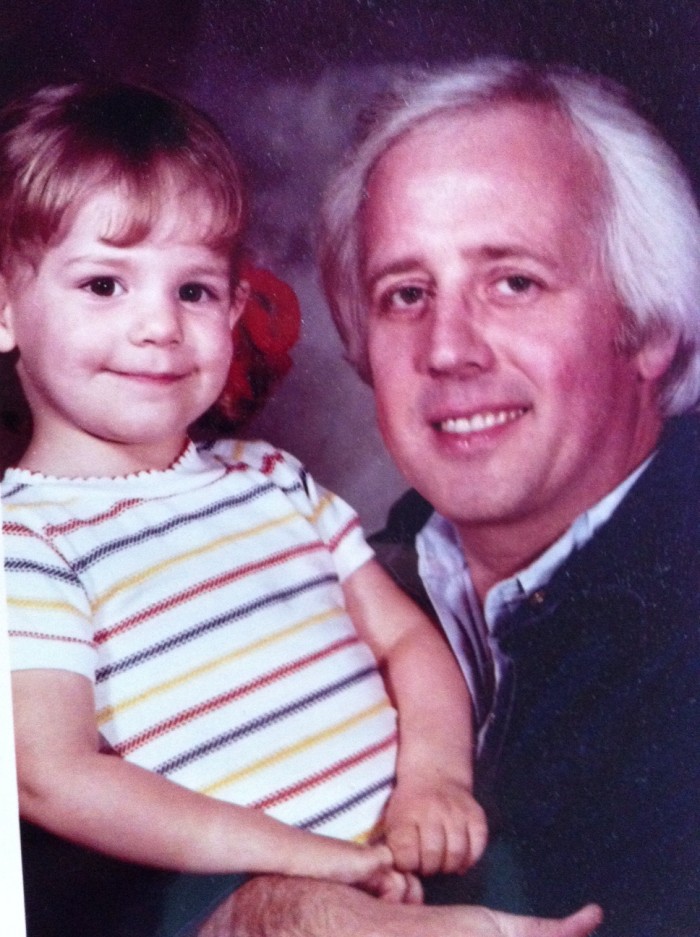My dad drank Budweiser for breakfast and Chivas for lunch.
Then he usually crashed by early evening, leaving me guessing what he would’ve had for dinner. I’m fairly certain it wouldn’t have been food. I was daddy’s little girl and often wondered as a kid why he didn’t love us enough to stop drinking, especially when it seemed clear that was the root of so many of our family’s troubles.
When I asked that question (silently, of course), I didn’t necessarily think there was something wrong with me. I was a good kid, until the rebellious teenage years, anyway: doting, obedient, perfectionist. I wondered what was wrong with him. What inside his head made his addiction more important than family, than home, than life itself?
The older I got, and the more entrenched I became in my own drinking, the more I understood: Life is hard and drinking is easy. It smoothes the rough corners and edges. It insulates. It facilitates escape to softer place.
Until it doesn’t. And you don’t need to hit rock bottom to trust that fact. It’s an inevitable progression if not interrupted. (Don’t believe me? Watch this.)
My dad knew. I remember a time about 10 years ago, several years before he died, taking him to lunch and telling him about some recent anxiety, depression and panic attacks I’d had.
“Get it fixed,” he said, and went on to share his own battles with depression, which I’d never understood before. “Get it fixed now.”
All these years, I thought he meant fix the depression for the sake of fixing depression. I didn’t understand until recently—with the insight of a remarkable therapist—that he was really telling to take the depression seriously enough so that it wouldn’t fuel the fire of addiction.
He wanted me to interrupt the progression so that I didn’t become like him.
It was a warning. He was trying to save me.
Those of us who struggle with addiction have to be willing to listen to the warnings—not just the voices that speak to us from the outside, but the faint voice inside that finds the courage to speak up every now and then. We have to heed the signs.
Of course, those signs take many forms. They’re not all towering billboards…or can’t-miss neon…or come with flashing cherries.
Sometimes they’re subtle. They whisper. They’re relatively benign.
Like the time I sat in a new doctor’s office, filling out page after page of intake forms. I remember feeling too embarrassed to answer truthfully the questions: “Do you drink alcohol? If so, how many drinks per week?” (FYI, the gov’t considers more than three drinks on any single day or more than seven drinks in a week to be “heavy” drinking for women. For guys, it’s more than four drinks a day, or 14 per week.)
That embarrassment was a sign. Or the time, at the end of a particularly stressful day, that my four-year-old asked me if I wanted a glass of wine “to feel better.” Or when my six-year-old drew a picture of the family eating dinner and outlined everyone’s drink: “Daddy: water. Sister: milk. Mommy: wine.”
That was a sign.
Or the time that I nearly hit another car head on because I was driving under the influence. I shudder to think of how my selfishness nearly cost someone else something precious.
Another warning.
I tried for years to drink less. I made New Year’s resolutions. Wine on weekends only, I’d swear. Drinking allowed only with dinner. For January 2013, I challenged myself to no wine for 30 days; I made it three.
That inability to curb my desire in the moment—along with the knowing that children of alcoholics are about four times more likely to develop alcohol problems—was another sign.
And it made me realize I needed a more drastic, permanent step.
I needed to stop modeling a pattern of behavior I didn’t want my kids to repeat, because I know what some youngsters do when they see their parents drink all the time. It’s monkey see, monkey do: They think a cocktail in hand ‘round the clock is completely normal because they have no reason to believe it’s not.
(Only as a parent can I appreciate my poor mother’s horror the day I showed up at her house one weekday afternoon, 16 years old and wearing my Catholic schoolgirl uniform, with a cold longneck in hand.)
But that behavior—whether it’s a drink or a drug or a lay or any other distraction we use to escape reality—does more than just take the edge off. As Brené Brown writes in “Daring Greatly,” “We can’t selectively numb emotions. Numb the dark and you numb the light.”
And life’s too amazing to journey through it numb.
So I stopped.
In one breath, I decided.
I released the clutch on my crutch.
Because I love them enough. Most importantly, I love myself.
Now, in the past year of sobriety, I’ve been working on repatterning more than the consumption habits. I’m resetting what “normal” looks like—for me, but mostly for my beautiful daughters. I want their normal to include the courage to work through the complicated situations head on, not to sidestep them with distractions. I want them to learn to feel and process the full, exhilarating range of human emotions—joy and grief, excitement and boredom, having your wishes fulfilled and longing for more.
It’s through the experience of that contrast that we appreciate the highs.
I want them to know that we can stumble and trip, fall and bleed, and still get up to walk, run and even fly again. I want them to know that those moments of struggle can actually bring us to a state of grace, if we are clear-headed and filled with intent.I have the intent… and I’m working toward the grace.
As the Zen saying goes: “No mud, no lotus.”
And as my late, great daddy told me: “Get it fixed.”
And as I say: “Love yourself enough.”
Relephant:
I Quit Drinking 4 Years Ago: My Transformation.
Author: Becky Vollmer
Editor: Renée Picard
Photo: via the author












Read 11 comments and reply